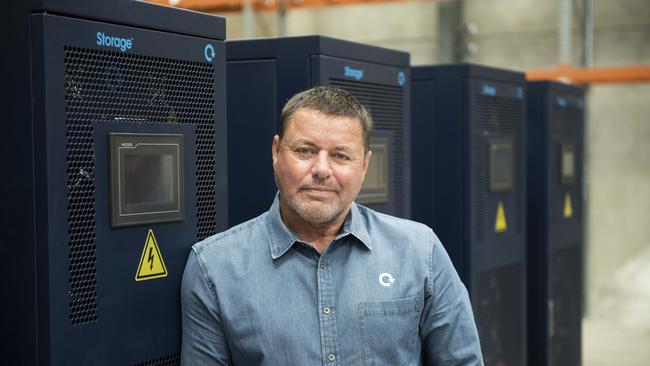Energy entrepreneur says Australia’s solar and battery boom is a ‘clear and present danger’
Brian Craighead says just like Hezbollah’s exploding pagers and walkie-talkies, Australia’s home and large battery storage systems present a threat to national security.

Israel’s booby-trap explosions – inside walkie-talkies and pagers – that killed and injured Hezbollah operatives has sparked a chilling warning that Australia’s battery storage systems are vulnerable to similar attacks.
While Australia isn’t facing any active threats, Brian Craighead – chief executive of Energy Renaissance which has developed a “cyber secure battery management system” with the CSIRO to power defence bases – says Australia’s love affair with solar power, and cheap Chinese-made batteries, has left the nation exposed.
He says the “hidden threat to national security” is in the software of about 250,000 home batteries that have been installed across Australia – “220,000 of which are from potentially non-friendly” sources.
“These things are good until they turn bad,” Mr Craighead said.
“When everyone talks about battery safety, we tend to think about the chemical stuff – these fires that you see on videos of Tesla cars going up. But those are relatively unusual. The key thing to focus on is battery software … that’s what protects them from overcharging.
“Let’s say you were a bad actor from a bad country, here’s what you could do, and this would be horribly easy. For example, you could say on January 7, 2025, I’m going to turn off the overcharge on 200,000 batteries installed in homes in Australia. Nothing is going to happen until then.”
Mr Craighead said the batteries would then keep charging with solar energy, instead of “stopping at a certain point” and “overcharge is when all hell breaks loose”.
“Whenever you talk about battery problem, it’s because it’s overcharging. Consider that a standard home battery contains approximately 7,500 times more energy than a pager. The catastrophic potential if such a device were compromised is immense,” he said.
“A co-ordinated attack exploiting these vulnerabilities could lead to widespread fires, explosions, and a crippling of our energy infrastructure. The risk extends beyond individual homes. Large, imported grid-connected batteries are becoming integral to Australia’s national energy grid. These massive storage systems, often managed by foreign-developed software, could be susceptible to cyber-attacks or sabotage, posing a threat to national security and public safety.
“There’s a clear and present danger.”
The nature of the risk is similar to the one linked to the boom in “smart home” devices. Hackers have infiltrated devices from baby monitors to spy on families, webcams have been hijacked to take down computer networks, while home thermostats have been raised – given most lack the virus protection and security updates that are found in PCs and smartphones.

And when it comes to batteries, Ms Craighead said most people did not think of them as smart devices.
“We describe this as a malevolent actor issue but equally it’s just incompetence. Think of IoT (Internet of Things devices). They just plug them in and nobody maintains the IoT software, so that smart camera you have is massively open to a hack.
“Chinese batteries are being dumped into Australia at the moment – they’re not being sold anywhere else. So it’s probably just as possible that through sheer negligence and incompetence this cheap battery, whoever built it has gone or it has been rebadged three times. They’re not maintaining it.”
The US banned the Pentagon from buying batteries from six Chinese manufacturers earlier this year.
Mr Craighead said it was not too late for the Australian government to take action, urging them to mandate that batteries are cyber-secure and issue product recalls if they’re not.
Energy Renaissance developed a cyberscure battery management system with the CSIRO, which embeds security measures at the core of the battery’s operation, protecting agains malicious interference in the nation’s energy grid.
“There is an architecture to this. We went to CSIRO, and it cost us millions, because they were the only ones that Defence would trust to do it the right way. But nobody does that because the pressure is to get the cheapest batteries in, buy them from China, plug them in and off we go.
“If you said you wanted to store 100 cans of diesel in your granny’s garage, you’d probably think twice about it. But because it (a battery) is this little thing in a box that looks cool, you never really think about it in that way. Any everything I’m saying, just multiply it by 1000 or 10,000 when it comes to big batteries. It’s nuts.
“It’s like pink batts on steroids. That’s the level of risk we’ve got right now.”
Mr Craighead was referring to the Rudd government’s $2.45bn Home Insulation Program, which was axed in 2010 after it was linked to three deaths and more than 200 house fires.
“The tragic events in Lebanon serve as a sad reminder of the potential dangers lurking within unsecured technology. As Australia continues its transition towards renewable energy, we must recognise the importance of securing the systems upon which we increasingly rely.
“There is a path forward. We can mitigate these risks by embracing secure, Australian-made solutions and enforcing strict cybersecurity protocols. The power that fuels our lives should be a source of security and confidence, not vulnerability. Now is the time to act decisively.”
More Coverage
Originally published as Energy entrepreneur says Australia’s solar and battery boom is a ‘clear and present danger’





